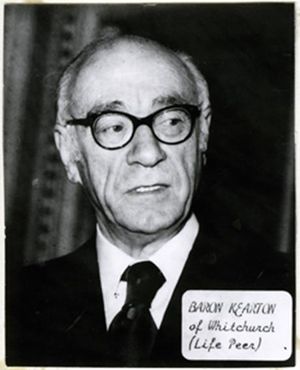Frank Kearton
(businessman, chemist) | |
|---|---|
 | |
| Born | 17 February 1911 |
| Died | 2 July 1992 (Age 81) |
| Nationality | British |
| Alma mater | St John's College (Oxford) |
| Children | • 2 boys • 2 girls |
| Spouse | Kathleen Lady Kearton |
WW2 nuclear researcher. Attended Bilderberg 1967 and 1972 as Chairman of chemical and textiles company Courtaulds. Later CEO of British National Oil Corporation. Life Peer.
| |
Christopher Frank Kearton, Baron Kearton, usually known as Frank Kearton, was British scientist and industrialist[1][2], who worked for the chemical and textiles company Courtaulds, and from 1975 became CEO of the newly formed British National Oil Corporation.
He attended the 1967 and 1972 Bilderberg meetings. He was also a life peer in the House of Lords and and Chancellor of the University of Bath.
Background
Kearton was born to Christopher John Kearton, a bricklayer, and Lilian (née Hancock) in Congleton, Cheshire, although the family moved to Tunstall in the Potteries not long after his birth. He completed his secondary education at Hanley High School before going up to St John's College, Oxford in 1929 as an open exhibitioner to read chemistry. He graduated with a First in 1933 although he did not apply for the promotion of his BA to an MA until 1959.[1]
Career
He then worked as an employee at the chemical company Imperial Chemical Industries (ICI) in London between 1933 and 1940, before working on the Atomic Energy Project, the British government's nuclear energy program, from 1940 to 1945 during the Second World War. This also involved collaboration with the US atomic bomb program (Manhattan Project) with Rudolf Peierls, Klaus Fuchs and Tony Skyrme, among others.[3] After the end of the war in 1945 he was awarded the Officer's Cross of the Order of the British Empire for his services there.[4]
In 1945 he joined the Courtaulds chemical and textiles company, which belonged to the family of Samuel Courtauld, as manager and head of a chemical engineering department. Thereafter, Kearton, who became a Fellow of the Royal Society in 1961, took over the position of Chairman of the Board and held this position for eleven years until 1975. During this time he was also President of the Society of Chemical Industry (SCI) from 1972 to 1974 and was also involved in 1973 to 1980 also as Chairman of the Royal Society for the Prevention of Accidents.
Kearton, who was knighted in 1966 and henceforth bore the suffix "Sir", was recognized by a Letters patent dated 5 February 1970 as a life peer with the title Baron Kearton, of Whitchurch in the County of Buckingham, Member of the House of Lords, of which he was a member until his death.
After leaving Courtaulds, he became Chairman and Chief Executive Officer of the British National Oil Corporation (BNOC), newly formed under the Petroleum & Submarine Pipelines Act 1975, and held these positions until 1979, and was also Chair of the British Association for the Advancement of Science. He then succeeded Christopher Hinton, Baron Hinton of Bankside as Chancellor of the University of Bath in 1980, a position he held until his death. At the same time he was from 1980 to 1982 chairman of ASLIB, the Association of Special Libraries and Information Bureau.
Personal life
Three years after leaving Oxford, on 16 April 1936, he married Kathleen Agnes (née Kay) whom he had met when at school through playing tennis. She had completed a French degree at Bedford College, London and was a teacher at Morecambe Grammar School. The couple later had two sons and two daughters.
Lord Kearton died from cancer on 2 July 1992.
Events Participated in
| Event | Start | End | Location(s) | Description |
|---|---|---|---|---|
| Bilderberg/1967 | 31 March 1967 | 2 April 1967 | United Kingdom St John's College (Cambridge) UK | Possibly the only Bilderberg meeting held in a university college rather than a hotel (St. John's College, Cambridge) |
| Bilderberg/1972 | 21 April 1972 | 23 April 1972 | Belgium Hotel La Reserve Knokke | The 21st Bilderberg, 102 guests. It spawned the Trilateral Commission. |
References
- ↑ a b http://www.oxforddnb.com/view/article/51170?_fromAuth=1
- ↑ http://www.thepeerage.com/p19148.htm
- ↑ http://books.google.de/books?id=8FKVl9ykfdQC&pg=PA52&lpg=PA52&dq=Christopher+Frank+Kearton&source=bl&ots=50Qxs_LV9V&sig=Z1CEu7qx_Oby8sUugMpyArj5aos&hl=de&sa=X&ei=y6r_UfiNGozUsgaE0oCADg&ved=0CDgQ6AEwAjgU#v=onepage&q=Christopher%20Frank%20Kearton&f=false
- ↑ http://www.independent.co.uk/news/people/obituary-lord-kearton-1536222.html